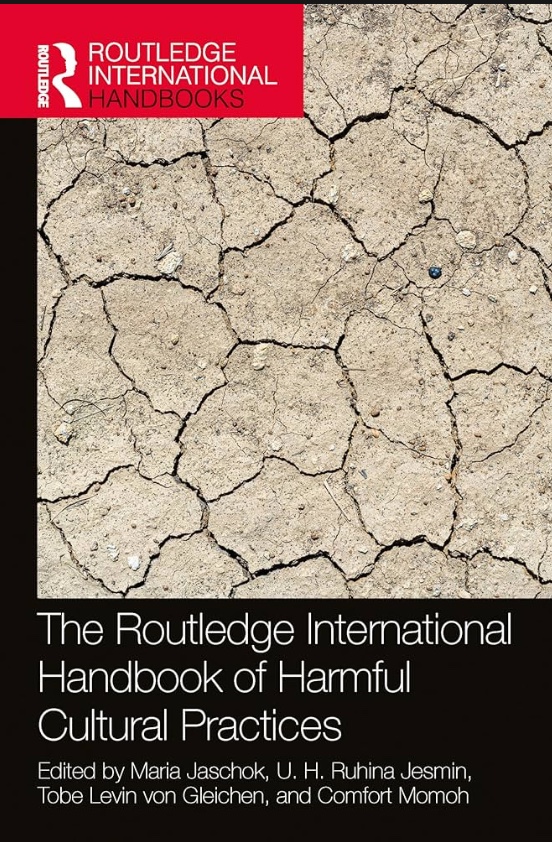Addressed to teachers at all levels, activists, policy-makers, and readers who care about girls’ and women’s wellbeing, this wide-ranging cornucopia of scientific analyses and literary essays promotes ending FGM. Its power derives from scholarship clearly presented to lay readers and contrasting viewpoints from all continents except Antarctica. Its intersectional lens illuminates FGM among allied abuses: early and forced marriage; surgical responses to intersex infants; the virginity complex in Western countries and more.
Dr. Tobe Levin von Gleichen and Dr. U.H. Ruhina Jesmin edit UnCUT/VOICES publications, and the fine work of a number of contributors, including Hilary Burrage, has also appeared under the UnCUT/VOICES colophon. We are proud of our association with Routledge in offering you this resource.

1st Edition
Edited By Maria Jaschok, U. H. Ruhina Jesmin, Tobe Levin von Gleichen, Comfort Momoh Copyright 2023
The Routledge International Handbook of Harmful Cultural Practices
Description
This handbook looks at cross-cultural work on harmful cultural practices considered gendered forms of abuse of women. These include female genital mutilation (FGM), virginity testing, hymenoplasty, and genital cosmetic surgery.
Bringing together comparative perspectives, intersectionality, and interdisciplinarity, it uses feminist methodology and mixed methods, with ethnography of central importance, to provide holistic, grounded theorizing within a framework of transformative research. Taking female genital mutilation, a topical, contested practice, and making it a heuristic reference for related procedures makes the case for global action based on understanding the complexity of harmful cultural practices that are contextually differentiated and experienced in intersectional ways. But because this phenomenon is enshrouded in matters of sensitivity and prejudice, narratives of suffering are muted and even suppressed, are dismissed as indigenous ritual, or become ammunition for racist organizing. Such conflicted and often opaque debates obstruct clear vision of the scale of both problem and solution.
Divided into six parts:
• Discourses and Epistemological Fault Lines
• FGM and Related Patriarchal Inscriptions
• Gender and Genitalia
• Female Bodies and Body Politics: Economics, Law, Medicine, Public Health, and Human Rights
• Placing Engagement, Innovation, Impact, Care
• Words and Texts to Shatter Silence
Comprised of 24 newly written chapters from experts around the world, this book will be of interest to scholars and students of nursing, social work, and allied health more broadly, as well as sociology, gender studies, and postcolonial studies.
TABLE OF CONTENTS
Part One: Discourses and Epistemological Faultlines
Chapter One – Constructing Excision, Writing Pain
Evelyne Accad
Chapter Two – Reflections on Femininity and FGM
Lorraine Koonce Farahmand
Chapter Three – FGM/C and the Female Perpetrator: Analysis of an Underdeveloped Figure
Daniela Hrzán
Chapter Four – The Archaeology of Female Genital Mutilation in German National Politics: “We-groups”, othering, and the pertinence of intersecting discourses “FGM and Femininity”
Lea Kristin Kleinsorg
Part Two: FGM and Related Patriarchal Inscriptions
Chapter Five – Trends in Female Genital Mutilation/Cutting: A qualitative investigation focusing on mothers of circumcised Nigerian girls
Oluchukwu Loveth Obiora, Johanna Elizabeth Maree, and Nokuthula Gloria Nkosi-Mafutha
Chapter Six – The British Campaign to Ban Virginity Testing and Hymenoplasty
Saarrah Ray
Chapter Seven – Is it really “easier to dig a hole than build a pole”? Feminist reflections on genital surgery for children born with ambiguous genitalia
Marion Hulverscheidt
Part Three: Gender and Genitalia
Chapter Eight – Circumcision as Inscriptions of Gender: Implications of Eradication or Sustenance
Mary Nyangweso
Chapter Nine – Patriarchal Inscription on African Women: Negotiating Zero Tolerance for FGM
Adebisi Adebayo
Chapter Ten – Marginalization of community voices in fighting female circumcision
Phyllis Livaha
Part Four: Female Bodies and Body Politics: Economics, Law, Health, and Human Rights
Chapter Eleven – What did the judge say? A comparative analysis of selected FGM case law in high-income & low-income countries
Micali Drossos, I., Komba, P., and Granier, L.M.C.
Chapter Twelve – FGM Studies: Economics, Public Health, and Societal Wellbeing
Hilary Burrage
Chapter Thirteen – FGM – Health, law, education and sustainable goals through upstream and downstream approaches
Felicity Gerry, Andrew Rowland, Charlotte Proudman, Joseph Home and Hoda Ali
Chapter Fourteen – Reclaiming Autonomy of Body: Comparing Memoirs by Khady Koïta and Hibo Wardere
U. H. Ruhina Jesmin
Chapter Fifteen – Emotional and behavioral consequences of FGM/C among West African women residents in the United States
Mariama Diallo
Chapter Sixteen – FGM in one of the world’s richest countries: the case of Singapore
John Chua
Part Five: Placing Engagement, Innovation, Impact, Care
Chapter Seventeen – “The law against Female Genital Mutilation (FGM) can scare people from performing FGM, but it doesn’t change their attitudes”: Findings of a qualitative study in Leeds, United Kingdom
Olayemi Babajide, Abimbola Babajide and Bassey Ebenso
Chapter Eighteen – Morbidity due to Female Genital Mutilation: A Scoping Review
Ava G. Chappell, Daniel C. Sasson, Abbas Hassan; Yufan Yan, Annie B. Wescott, Melissa Simon, Lori A. Post, and Sumanas W. Jordan
Chapter Nineteen – Female Genital Mutilation in African and African Diaspora Memoir and Fiction
Tobe Levin von Gleichen and Pierrette Herzberger-Fofana
Chapter Twenty – Assessment of oral media utilization on ‘female circumcision’ among the Abagusii of Kenya
Felister Nyaera Nkangi
Part Six: Words and Texts to Shatter Silence
Chapter Twenty-one – Voices to End Female Genital Mutilation/Cutting: Using Digital Storytelling to End a Harmful Social Norm
Mariya Taher, Amy Hill, Sandra Yu, and Kamakshi Arora
Chapter Twenty-two – FGM in Germany in the Context of Migration
Abadjayé Gwladys Awo
Chapter Twenty-three – ‘I’m going to be judged for having FGM’: national health service experiences described by women affected by female genital mutilation in the United Kingdom and Europe
Rewan Youssif* & Charnele Nunes*, Manar Marzouk, Sameera Hassan, Mervat Alhaffar, and Natasha Howard
Chapter Twenty-four – “This is not my fatherland.” Female Genital Mutilation: Stories from the lives of Nigerian exiles in Italy
Annagrazia Faraca
It is scheduled for publication on 4 December, 2023.

Hi Thanks for mailing me. The name Hilary is correct. Avoid double L. See, I have cc’d her in this mail. Have a good day.
Thanks Ruhina